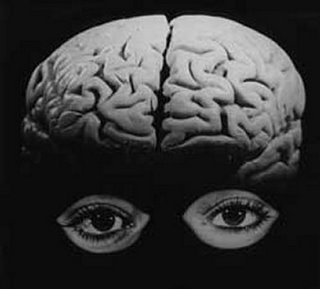 You haven't heard this on the evening television news, or any television news program for that matter. You're not likely to, either: Watching television can damage your child's brain.
You haven't heard this on the evening television news, or any television news program for that matter. You're not likely to, either: Watching television can damage your child's brain.If you're a kid you secretly think it might be true but you've been keeping it to yourself, right? After all, everybody has one.
If you're a young adult with a child of your own, the idea might nag at you occasionally -- especially when you feel rushed or overwhelmed. But you tell yourself you just have to use it now and then as a 'babysitter' -- and how harmful could it really be, anyway? After all, everybody has one one.
If you're a grandparent, occasionally you may have a vague, foreboding sense of doom as you watch your own adult children plunking your grandkids down in front of the TV. Maybe you've even read reports of last year's study by doctors Linebarger and Walker concluding television watching impairs the language, cognitive, and attentional development of children. But everybody has one.
Now, more hard evidence has arrived: Television really is bad for the brain. Gregg Esterbrook of Slate Magazine has the story, titled "Television Might Cause Autisism."
"Today, Cornell University researchers are reporting what appears to be a statistically significant relationship between autism rates and television watching by children under the age of 3. The researchers studied autism incidence in California, Oregon, Pennsylvania, and Washington state. They found that as cable television became common in California and Pennsylvania beginning around 1980, childhood autism rose more in the counties that had cable than in the counties that did not. They further found that in all the Western states, the more time toddlers spent in front of the television, the more likely they were to exhibit symptoms of autism disorders.The full study can be read on the Johnson School web site for Cornell University. To be sure, the authors are not saying their statistical proof is dispositive. But they are saying the correlation is more than coincidental.
The Cornell study represents a potential bombshell in the autism debate."
In the field of statistics, a "statistically significant correlation" means the frequency of occurrence of the two phenemonena -- increased television watching and increased autisim among children -- cannot reasonably be explained by mere chance. Instead, it strongly suggests causation, although the specific causal mechanism has yet to be proved.
"We are not saying we have found the cause of autism, we're saying we have found a critical piece of evidence," Cornell researcher Michael Waldman told Esterbrook. The "statistically significant" correlation is important probative evidence -- so reliable, in fact, that it likely would be admissible evidence in a court of law.
On the strength of the same kind of statistical evidence, the U.S. government began warning decades ago that cigarettes cause lung cancer and Thalidomide when ingested during pregnancy causes birth defects. Only later did we learn those things cause a lot of other miseries, too.
It's time parents paid heed: "boycott the boob tube" as one Canadian writer urges. Keep your kids as far away from television as you can. Throw it out the window. Haul it away to the junk yard. At a minimum, keep the damn thing turned off while your kids are awake.
Try buying or borrowing more books for them. Or, as the study's authors put it with greater restraint:
"[W]e believe our results provide sufficient support for the possibility that until further research can be conducted it might be prudent to act as if it were [already proved]. In other words, maybe there should be additional emphasis placed on the recommendation of the American Academy of Pediatricians that early childhood television watching should be eliminated or at the very least quite limited... the current recommendation is that there should be no television watching before the age of two and no more than one to two hours per day for older children). We see little downside in taking this step and a very large upside if it turns out that television indeed causes autism.As for us adults, it's probably too late. Our brains already have been addled. How else explain the "shambles" of a Congress we seem to have voted into office?






No comments:
Post a Comment